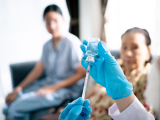Jun 17, 2009
Sanofi donates 100 million pandemic vaccine doses to WHO
A Sanofi executive announced today at a health conference in Seattle that the company will donate 100 million doses of novel H1N1 influenza vaccine to the World Health Organization (WHO) to support its efforts to help the world's poorest nations respond to the pandemic, the company said in a press release. The company said that once vaccine production begins it will set aside 10% of doses to donate to the WHO. Novartis said recently it will provide discounted, but not free, vaccines.
[Jun 17 Sanofi press release]
Novel flu cases soar in Chile
The number of novel H1N1 cases in Chile surged to 3,125 today, Agence France-Presse (AFP) reported, citing a government update. The number is 1,431 more than the total for Chile reported by the WHO on Jun 15. Chile has reported two deaths from the virus, which seems to be striking children the hardest: 64% of infections are reported in the 5- to 19-year-old age-group. Elsewhere in South America, Argentina reported three more deaths, according to media reports.
[Jun 17 AFP story]
Australia moves to new pandemic alert level
Australian Health Minister Nicola Roxon today raised the country's pandemic response level from "contain" to "protect," according to a government statement. The level is a new phase that was created to address the moderate severity of the novel H1N1 pandemic and is in line with the WHO's phase 6 declaration, the government said. The "protect" phase calls for an emphasis on treating people who have severe infections. Roxon said states will phase in the new response level by Jun 26.
[Jun 17 Australian government statement]
NYC reports 7 more H1N1 deaths
Health officials in New York City reported seven more novel H1N1 deaths, raising the total to 23, according to the city's latest surveillance update. Few details were available about the latest victims, though the report said all were between the ages of 25 and 64 and that most were hospitalized in late May at the peak of the outbreak. Overall, of the 20 deceased patients whose history was known, 16 had underlying medical conditions that put them at higher risk.
[New York City Department of Health report]
Tamiflu, Relenza appear safe for pregnant women
Limited data indicate that the flu drugs oseltamivir (Tamiflu) and zanamivir (Relenza) are relatively safe for pregnant women, who are at increased risk for flu complications, says a review in the Canadian Medical Association Journal. Oseltamivir is preferable for pregnant women because more safety data are available, but either drug may be used. Both drugs are considered compatible with breastfeeding. The novel H1N1 virus is sensitive to both drugs but resistant to older antivirals.
[Early-release CMAJ article]
US Virgin Islands, St. Maarten report first cases
Two Caribbean island territories, the US Virgin Islands and Dutch St. Maarten, have reported their first H1N1 flu cases, according to the Associated Press (AP). In the Virgin Islands, a woman who recently returned to St. Thomas from a trip abroad had the virus but was doing well. On St. Maarten, a 22-year-old American student at the American University of the Caribbean was recuperating, the story said.
[Jun 16 AP report]


















